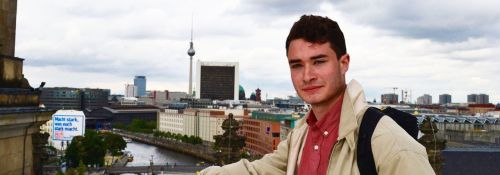
Getting to Know the Language, Culture, and People of Germany
Written by Finn Cleary
This past summer, I tested my German comprehension on the study-abroad trip to Würzburg in south-central Germany. For a month, I read Goethe, talked to German students, navigated the public transit system, and asked for directions and help twice a day. I was prepared for what I had heard from other Americans who had spent time in the country:
“The Germans are quiet, and they won’t talk to you.”
“You’ll sit next to them at a restaurant or on the bus and never make eye contact.”
“They won’t invite you over to their house until you’ve known them for at least six weeks.”
My neighbor on the flight over had lived in Germany for four years with his wife and daughter and warned me, “They’ll stare at you, but you’ll get used to it. They can pick an American out of a crowd in seconds. It’s just a skill they’ve developed.” I nodded along, but visions of Germans staring me down on a train played out in my head. He turned back to watching a movie on his iPad, and I stared at my Concise German Grammar for English Speakers.
Two days later, my friend and I met our first German student when we asked him for help reading a bus timetable. He walked us to the next bus stop and then invited us to his apartment to watch the Germany-Italy soccer match that night. There we met more students, who were excited to share their soccer culture with us.
Germany was far more hospitable than anyone had made it out to be. The students were eager to meet Americans, and my questions about their language and literature were met with questions about food, big cars, and rap music in America. My stumbling German was met with praise from the Germans, who would correct us when we seemed hesitant to put an ending on an adjective or mixed up a verb tense.
Our classwork was centered around reading a play by Goethe, Götz von Berlichingen. The narrative centers around a historical figure, Götz, who was a knight in the sixteenth-century Holy Roman Empire. Goethe’s work is a classic in German literature, and Götz is a celebrated figure of medieval lore who fought against a world that sought to force him to conform against his ideals of chivalry and order. Goethe highlights his commitment to the guarantee of freedom and justice, exemplifying and foreshadowing his own Enlightenment ideals.
The Germans cherish tradition. They are lovers of the biergarten and Bach. They close their shops and stores on Sundays, even as big box stores and megamarts grow in popularity. I saw some people around my age wearing lederhosen and plaid shirts.
But the Germans have not remained in an archaic society. They have an incredible system of public transport and infrastructure, and their advances in technology and engineering have made their economy one of the strongest in the world. I saw sitting at brunch on a Saturday more Mercedes-Benzes and Audis than I’ve ever seen in my life. When I boarded a boat tour on the river Main, the captain came over the intercom to welcome us onboard and give us a brief overview of the journey to a tiny town full of gardens and a summer palace northwest of Würzburg. He then continued to give a detailed description of the ship, including the exact number of seats onboard, the specifications for the motor, and the top speed of the ship. The Germans sitting around me, older retirees, nodded along in silence, as though they simply expected this sort of calm technical explanation as a part of their everyday lives.
Walking in Würzburg was also incredible, not just for the thousand-year-old cathedrals and mid-eighteenth-century cobblestones, but because the city was so alive and vibrant. The Juliusspital, a winery we toured on the second day, was housed in a building over four hundred years old and packed with sleek aluminum presses and tanks. The incredible museums, theaters, and galleries are a testament to the German commitment to staying innovative in the twenty-first century.
As a history major, this blend of the old and the new fascinates me. The Germans find an incredible strength in drawing from their rich history while remaining committed to modern principles of an open and integrated society.
I went to Germany expecting to spend most of my time studying our play and learning about the literary culture surrounding Goethe. I learned that the elements and themes in a story from two hundred years ago are played out in their society today. My education wasn’t just learning how to decipher archaic German grammar or studying the history of Berlin and Munich, but in talking with students from all over Germany and living in their beautiful country.
 Finn Cleary, ‘18, is from the cultural hub of America, Columbus, Ohio. He plans on majoring in history and working in the public policy field.
Finn Cleary, ‘18, is from the cultural hub of America, Columbus, Ohio. He plans on majoring in history and working in the public policy field.